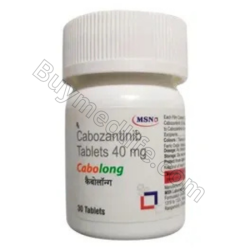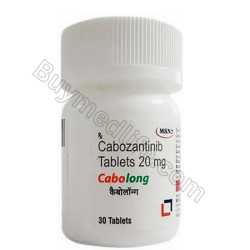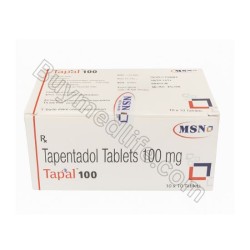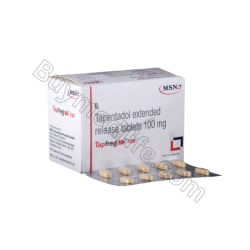CABOLONG 60 MG
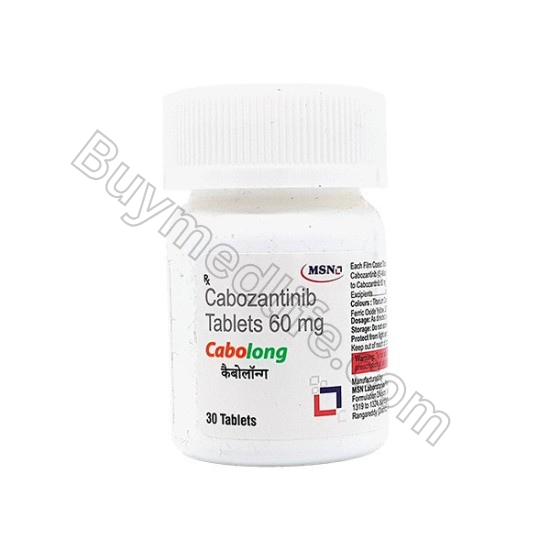
- Stock: In Stock
- Brand: MSN Laboratories
- Model: Cabolong 60 mg
- SKU: CBLG60
- Active Ingredient: Cabozantinib
- Treatment: Cancer
Available Options
Cabolong 60 mg is a prescription medication that contains the active ingredient Cabozantinib, a tyrosine kinase inhibitor. It is used to treat various types of cancer, including renal cell carcinoma, hepatocellular carcinoma, and medullary thyroid carcinoma.
What is Cabolong 60mg?
Cabolong 60mg is a small molecule inhibitor that targets multiple receptor tyrosine kinases, including RET, MET, and VEGFR2. By inhibiting these kinases, Cabolong 60mg blocks the signaling pathways that promote cancer cell growth and proliferation.
Uses of Cabolong 60mg:
Cabolong 60 mg is indicated for the treatment of:
Renal Cell Carcinoma (RCC): Cabolong 60 mg is used to treat advanced RCC, a type of kidney cancer that originates in the lining of the proximal convoluted tubule.
Hepatocellular Carcinoma (HCC): Cabolong 60 mg is used to
treat advanced HCC, a type of liver cancer that originates in the main type of
liver cell (hepatocyte).
Medullary Thyroid Carcinoma (MTC): Cabolong 60 mg is used to
treat progressive, metastatic MTC, a type of thyroid cancer that originates in
the parafollicular cells (also known as C cells) of the thyroid gland.
Additional Indications:
Cabolong 60mg may also be used to treat other types of
cancer, including:
Differentiated Thyroid Carcinoma (DTC): Cabolong 60 mg may be used to treat progressive, metastatic DTC, a type of thyroid cancer that originates in the follicular cells of the thyroid gland.
Other Solid Tumors: Cabolong 60 mg may be used to treat
other types of solid tumors, including pancreatic cancer, breast cancer, and
non-small cell lung cancer.
Mechanism of Action of Cabolong (Cabozantinib) 60 mg
Cabolong (Cabozantinib) 60mg is a tyrosine kinase inhibitor
that works by inhibiting the activity of multiple receptor tyrosine kinases,
including:
RET (Rearranged during Transfection): a receptor tyrosine kinase involved in the growth and proliferation of cancer cells
MET (Mesenchymal-Epithelial Transition factor): a receptor
tyrosine kinase involved in the growth and proliferation of cancer cells
VEGFR2 (Vascular Endothelial Growth Factor Receptor 2): a receptor tyrosine kinase involved in angiogenesis (the formation of new blood vessels)
Dosage of Cabolong 60mg
The recommended dosage of Cabolong 60mg varies depending on the specific condition being treated and the individual patient's response to the medication.
Recommended Dosage:
Renal Cell Carcinoma (RCC): The recommended dosage of Cabozantinib 60mg for RCC is 60mg orally once daily.
Hepatocellular Carcinoma (HCC): The recommended dosage of
Cabozantinib 60mg for HCC is 60mg orally once daily.
Medullary Thyroid Carcinoma (MTC): The recommended dosage of
Cabozantinib 60mg for MTC is 60mg orally once daily.
Side effects of Cabolong 60 mg:
Cabozantinib 60 mg is generally well-tolerated, but like all
medications, it can cause side effects in some patients. The most common side
effects of Cabolong 60mg include:
- Fatigue
- Nausea
- Diarrhea
- Vomiting
- Stomatitis (Inflammation of the mouth)
- High blood pressure
- Decreased appetite
- Taste change
- Low blood platelets
- Anemia (low number of red blood cells)
- Palmar-plantar erythrodysesthesia syndrome
- Decrease in body weight
- Increased liver enzymes
- Dyspepsia
Other Substitute
Warnings and Precautions
Cabozantinib 60 mg is a prescription medication that can cause serious side effects. It is essential to be aware of the warnings and precautions associated with this medication to minimize the risk of adverse reactions.
Warnings:
Hepatic Impairment: Cabolong 60 mg can cause liver damage,
and patients with pre-existing liver disease may be at increased risk.
Bleeding: Cabolong 60 mg can increase the risk of bleeding,
and patients with a history of bleeding disorders may be at increased risk.
Gastrointestinal Perforation: Cabolong 60 mg can cause
gastrointestinal perforation, and patients with a history of gastrointestinal
disease may be at increased risk.
Fistula Formation: Cabolong 60 mg can cause fistula
formation, and patients with a history of gastrointestinal disease may be at
increased risk.
Cardiovascular Events: Cabolong 60 mg can increase the risk
of cardiovascular events, including myocardial infarction and stroke.
Precautions:
Pregnancy: Cabolong 60 mg is contraindicated in pregnant women, as it may cause fetal harm.
Breastfeeding: Cabolong 60mg is contraindicated in
breastfeeding women, as it may be excreted in breast milk.
Pediatric Use: The safety and efficacy of Cabolong 60mg in
pediatric patients have not been established.
Geriatric Use: The safety and efficacy of Cabolong 60mg in
geriatric patients have not been established.
Renal Impairment: Patients with renal impairment may require
dose adjustments.
Hepatic Impairment: Patients with hepatic impairment may
require dose adjustments.
Concomitant Medications: Cabozantinib 60mg may interact with
other medications, including CYP3A4 inhibitors and inducers.
Conclusion:
Cabolong 60mg is a tyrosine kinase inhibitor used to treat various types of cancer. It works by inhibiting the activity of multiple receptor tyrosine kinases, leading to a decrease in cancer cell growth and proliferation. Common side effects include diarrhea, palmar-plantar erythrodysesthesia, hypertension, fatigue, and nausea. Serious side effects can occur, including liver damage, bleeding, gastrointestinal perforation, and fistula formation. Regular monitoring and follow-up appointments are essential to minimize the risk of adverse reactions.

